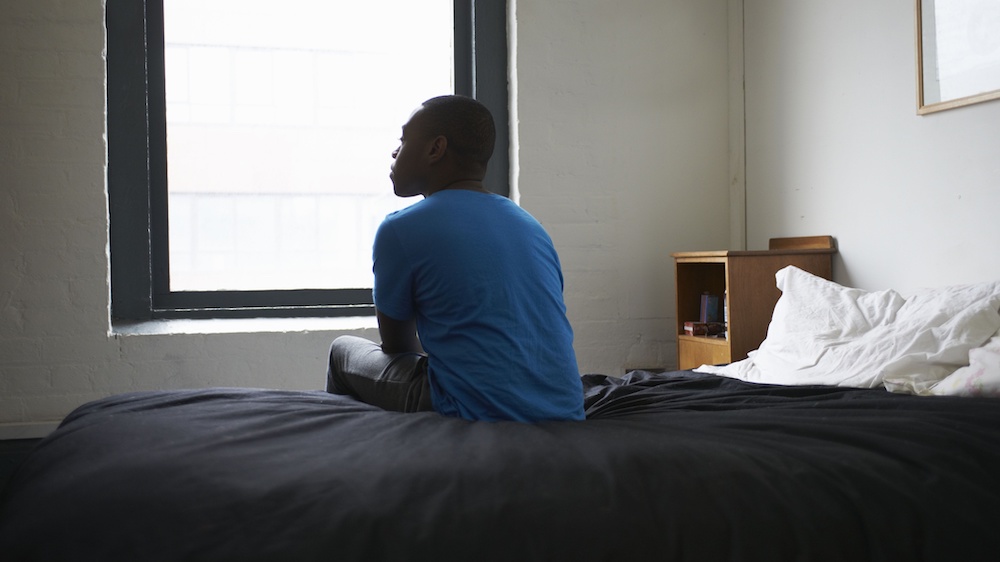If you’re interested in sharing your opinion on any cultural, political or personal topic, create an account here and check out our how-to post to learn more.
Opinions are the writer’s own and not those of Blavity's.
____
I was diagnosed with HIV at the age of 21 while I was in college. Today, more than 1.2 million people are living with HIV/AIDS in the U.S., including 482,900 who are Black like me.
In the years since I walked outside the student health center wearing a bucket of tears, not knowing what lie ahead, annual HIV diagnosis rates have dropped, new HIV diagnoses among Black people overall have declined, and new diagnoses among Black gay and bisexual men has stabilized. From 2014 to 2018, HIV diagnoses decreased 7% among Black/African American people overall.
The pill chart on the back of the doctor’s door has far more options now than when I was diagnosed, as more than 15 new drugs have since been approved by the FDA to tackle the virus in my body with fewer side effects and less toxicity. Since my diagnosis, I’ve changed treatment over half a dozen times.
Despite the progress, Black Americans continue to be disproportionately affected, and that disparity has widened in the 40 years since HIV was first diagnosed in 1981.
When I was diagnosed in 2003, Black Americans accounted for 49% of reported AIDS cases, while Black people also made up more than half of new HIV infections. Today, the numbers haven’t changed much. Although Black Americans represent only 12% of the U.S. population, they account for 43% of new HIV diagnoses and an estimated 42% of people living with HIV. The rate of new HIV diagnoses per 100,000 among Black adults/adolescents is still a staggering eight times that of whites. Black men are still the highest of any group. Black women still have the highest rate among women. In recent years, HIV diagnoses decreased among all age groups, except for Black/African American people aged 25 to 34, whereby that population saw a 7% increase between 2014 – 2018.
According to scholars, the dogged persistence of disproportionate infection rates among Black Americans is due to a variety of factors, including poverty, stigma and lack of access to care. But there’s another factor that inhibits our ability to curb the disproportionate infection rates among Blacks: the fear of criminalization.
People like me living with HIV (PLHIV) live under the threat of (re)entering the criminal justice system whether or not we have ever transmitted the virus to another person. Amidst my profound grief after just learning I had HIV, I was counseled by my social worker concerning the real threat of criminal non-disclosure: If I didn’t voluntarily tell potential and past partners, I could go to prison. The day I was diagnosed, my Black body became criminalized.
As of 2021, 35 states have laws that criminalize HIV exposure. These laws increase the sentence when a person with HIV commits certain crimes, and criminalize or controls behaviors that can potentially expose another person to HIV or an STD. In some cases, general criminal statutes, such as attempted murder, are used to criminalize potential exposure. Some states have a maximum sentence length of up to life in prison.
Many of these state laws criminalize behaviors that cannot transmit HIV and can be used to prosecute regardless of actual transmission, according to the CDC. The threat of prosecution produces more stigma and discourages many from getting tested for HIV. This is especially true for Black Americans, who are already over-policed and disproportionately tried and sentenced.
The face of HIV criminalization in the U.S. is Black men like me. The United States leads the world in HIV criminalization and prosecution, and more than 50% of those accused in 2020 were Black or of color.
The Civil Rights Division of the Department of Justice has issued guidance to states to support the repeal of these draconian laws, and since 2014, at least nine states have modernized or repealed their HIV criminal laws. This year Nevada, Virginia and Indiana reformed their laws with bipartisan support. Just this past summer, Illinois became the first state since Texas in 1994 to fully repeal the law.
At the federal level, earlier this year Reps. Barbara Lee (CA-13) and Jennifer González Colon (PR-At Large), Co-Chairs of the Congressional HIV/AIDS Caucus, again reintroduced the bipartisan Repeal HIV Discrimination Act. Since 2013, it has yet to pass out of the House Judiciary Committee and, according to Skopos Labs, has a dismal 4% chance of passage.
The battle to end AIDS must include decriminalization of HIV, and that will most likely be won at the state level. But GOP politicians’ nonresponse underscores “racist body politics” at work as they ignore the needs of constituents that likely won’t vote Republican. Most state legislatures continue to do nothing, and most are in GOP control.
We must get involved where we are. Just like we must continue to do with the COVID-19 vaccine-hesitant Americans, we can decrease stigma by talking with neighbors and friends about the current science. When we roll back HIV criminalization laws, more people will feel free to get tested and we will lift the burden on people living with HIV.
